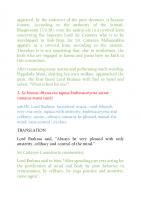Sri Caitanya Upanisad V.1
280 64 194KB
English Pages 17
Recommend Papers

- Author / Uploaded
- Srila Ved Vyasa - (Rediscovered By Srila Bhaktivinoda Thakura)
File loading please wait...
Citation preview
CAITANYA
UPANISAD
1. Atha pippaladah samit panir bhagavantam brahmanam upasanno. bhagavan me subham kim atra caksvasveti atha-thereafter; Pippaladah-Pippalada; samit- panih-with sacrificial fuel [sacred wood] in hand; bhagavantam—the opulent; brahmanam-Lord Brahma; upasannahapproached; Bhagavan-O My Lord; me-unto me; subham— auspicious; kim-what; atra—in this world; caksasva-please tell; iti-thus. Thereafter, Pippalada, with sacrificial fuel in hand, approached Lord Brahma and said, "O My Lord, in this world, please tell me what is the real auspiciousness?" Sri Caitanya-caranamrta Bhasya: Commentary of Srila Bhaktivinoda Thakura: Panca-tattvanvitam natva Caitanya-rasa-vigraham Caitanyopanisad-bhasyam karomyatma-visuddhaye After offering obeisances unto the Panca-Tattva, I am writing this commentary on the Caitanya Upanisad, which is the form of the mellow of Lord Caitanya, for self purification. This Caitanya Upanisad which is included within the eternal Atharva-Veda, and which is full of all bliss, has thus far not been manifest due to being beyond the vision of persons who have become blinded by the influence of the illusory energy and whose minds are directed towards external matters. Then, when Caitanya Mahaprabhu, the moon of Navadvipa,
appeared, by the endeavor of the pure devotees, it became known. According to the authority of the SrimadBhagavatam (7.9.38), even the sastras are in a covered form concerning the Supreme Lord Sri Caitanya who is to be worshipped in Kali-Yuga [or Sri Caitanya Mahaprabhu appears in a covered form according to the sastras]. Therefore it is not surprising that, due to misfortune, the fools who are engaged in karma and jnana have no faith in this connection. After examining many sastras and performing much worship, Pippalada Muni, desiring his own welfare, approached the guru, the four faced Lord Brahma with fuel in hand and asked, "What is best for me?" 2. Sa hovaca. bhyua eva tapasa brahmacaryena sasvat ramasva mano vaseti sah-He, Lord Brahma. ha-indeed; uvaca—said; bhuyahvery; eva-only; tapasa-with austerity; brahmacaryena-and celibacy; sasvat—always; ramasva-be pleased; manah-the mind; vasa-control ; iti-thus. TRANSLATION Lord Brahma said, "Always be very pleased with only austerity, celibacy and control of the mind." Sri Caitanya-Caranamrta commentary Lord Brahma said to him: "After spending one year acting for the purification of mind and body by pure behavior in renunciation, by celibacy, by yoga practice and austerity, come again".
3. Sa tatha bhutva bhuya enam upasadyaha-bhagavan kalau papac channah prajah katham mucyeran iti sah-he, Pippalada; tatha-so; bhutva-becoming; bhuyahvery; enam-thus; upasadya-approaching; aha-said; bhagavanO my Lord; kalau-in Kali; papat-due to sin; channahcovered; prajah-people; katham-how; mucyeran-can be liberated; iti-thus. TRANSLATION He, Pippalada, becoming pure in mind, again approached his father and said: "O my Lord Brahma, in the age of Kali Yuga, people are covered due to sin. How can they obtain liberation?" Sri Caitanya-Caranamrta commentary. After practicing purification of the body and mind by celibacy and austerity, Pippalada again approached his guru and inquired, "In Kali-Yuga, how can those who are sinful by nature obtain liberation from the material condition?” 4. ko va devata ko va mantro bruhiti. kah-which; vazor; devata-deity; kah—which; vaor; mantrah-mantra; brohi-Please tell (me); iti-thus. TRANSLATION Please tell me which deity or which mantra is worthy of service. Sri Caitanya-Caranamrta commentary
Oh, my Lord, for the living beings whose minds are contaminated by Kali-Yuga, please tell me which deity or which mantra should be served. 5. rahasyasn te vadisyarni—jahnavi-tire navadvipe golokakhye dhamni govindo dvi-bhujo gaurah sarvatma mahapuruso rnahatma maha-yogi tri- gunatitah satva-rupo bhakti Ioke kasyatiti, tad ete sloka bhavanti sah-he, Lord Brahma; ha-indeed; uvaca-replied; rahasyamconfidential truth; te-unto you; vadisyami-I will tell; jahnavitire-on the bank of the Jahnavi; navadvipe-in Navadvipa; goloka-akhye- which is known as Goloka; dhamniabode; govindah-Lord Govinda; dvibhujahwith two arms; gaurah-golden complexion; sarvaatma-the Supersoul; maha-purusah-the greatest Personality; maha-atma; the Supreme Being; maha-yogi-the greatest yogi; tri-guna-atitah-who is transcendental to the modes of nature; satva-rupah-the form of truth; bhaktimdevotional service; loke-in the world; kasyati-will manifest; iti-thus; tat-that; ete-these; slokah-verses; bhavantiare. TRANSLATION Lord Brahma replied, "I will tell you the confidential truth. On the bank of the Jahnavi, in Navadvipa Dhama, which is known as Goloka, Govinda with two arms, golden complexion, the Supersoul, the greatest Personality, the greatest Yogi, the Supreme Being, Who is transcendental to the modes of nature, and Whose form is truth, will appear to manifest devotional service ( bhakti ) in this world. These verses describe that.
Sri Caitanya caranamrta commentary In the eleventh canto of the Srimad-Bhagavatam, (11.5.3334) the state of being of the Supreme Personality of Godhead, Sri Caitanya, the savior of Kali-Yuga is proven. dhyeyam sada paribhava-ghnam abhista-doham tirhaspadam siva-virinci-nutam saranyam bhrtyarti-ham pranata-pala bhavabdhi-potam vande maha-purusa te caranaravindam O Supreme Person, O Protector of the devotees, I offer my respectful obeisances unto Your lotus feet which are worthy of being constantly meditated upon, which destroy misery, yield all desire, which are the abode of all holy places of pilgrimage, which are praised by Lord Siva and Lord Brahma, which are the shelter of all, which dispel the distress of the devotees and which are a boat for crossing over the ocean of material existence. tyaktva sudustayja-surepsita-rajya-laksmim dharmistha aryavacasa yad agad aranyam maya-mrgam dayitayepsitam anvadhavad vande maha-purusa te caranaravindam "We offer our respectful obeisances unto the lotus feet of the Lord, upom whom one should always meditate. He left his householder life, leaving aside His eternal consort, whom even the denizens of heaven adore. He went into the forest to deliver the fallen souls, who are put into illusion by the material energy." ( I ) 6. eko devah sarva-rupi mahaana gauro rakta-syamala-svetarupah caitanyatma sa vai caitanya-sakdir bhaktakaro bhaktido bhakti-vedyah
ekah-one; devah-Lord; sarva-rupi-the form of all; mahaatmagreatest Personality; gaurah-Gaura; rakta-red; syamalablackish; sveta-white; rupah- whose form; CaitanyaCaitanya; atmaHimself; sah-he; vaiindeed; Caitanya-saktihthe embodiment of the spiritual potency; bhakta-of a devotee; akarah-the form; bhakti-dah-bestower of devotional service; bhakti-by devotional service; vedyah-He can be known. TRANSLATION The one Supreme Personality of Godhead, who appears in a variety of transcendental forms, is also knows as Gaura. He has also appeared in various complexions such as red, blackish and white. He shall appear in the form of Gaura. He Himself is Caitanya, the embodiment of cit-sakti. He shall appear in the form of a devotee, to bestow devotional service to the Lord and He is also to be known by devotional service. Sri Caitanya-Caranamrta commentary In the Srimad-Bhagavatam (10.8.13), characteristics are described by Gargamuni:
the
Lord's
suklo raktas tatha pita idanim Krsnatam gatah "He has been white, red, and yellow and now (in DvaparaYuga), he is blackish." In Kali-Yuga, He takes the form of a devotee. The confidential truth is that the Lord has descended with His own abode, Goloka-Dhama, to the supremely sanctified land of Gauda, in the form of a devotee as Sri Krsna Caitanya Himself and desiring to deliver love of God, He has exposed the transcen-
dental secret of madhura-rasa which enlivens all the devotees in the material world, headed by Sathakopa, Ramanuja,V isnuswami, Madhvacarya, Nimbarka, etc., for the purpose of quickly bestowing auspiciousness unto the living beings in Kali-Yuga. Bhakti vedyah means that the living entities can know the Lord by the practice of devotional service and not by the practice of dry philosophical speculation. 7. namo vedanta vedyaya krsnaya paramenane sarvacaitanya-rupaya caitanyaya namo namah namah-obeisances; vedanta-by vedanta; vedyaya- who can be known; Krsnaya-unto Krsna; parama- atmane-who is the Supersoul; sarva—of everything; caitanyaconscious; rupayawhose form; caitanyaya- -unto Caitanya Mahaprabhu; namah namah- obeisances again and again. TRANSLATION I offer my respectful obeisances unto He who is to be understood by Vedanta, who is Krsna, the Supersoul, whose form is conscious of everything. Obeisances again and again unto Lord Sri Caitanya Mahaprabhu. Sri Caitanya-Caranamrta commentary Even Lord Brahma offers his obeisances unto Sri Caitanya after considering His unlimited mercy upon Lord Brahma's own Madhva sampradaya. 8. vedanta vedyam purusam puranam caitanyatmanam visvayonim mahantam tam eva viditva ti-mrtyum eti nanyah pantha vidyatetyanaya
vedanta-vedyam-who can be known by vedanta; purusamperson; puranam-the oldest; caitanya-Caitanya; atmanamHimself; visva-yonim-the source of the universe; mahaantam-the greatest; tam-Him; eva-certainly; viditva-upon knowing; ati- mrtyam-beyond death; eti-one goes; nanot; anyah--another; pantha-means; vidyate-there is; ayanaya-for going. TRANSLATION By knowing Him, who is to be known by Vedanta, who is the oldest personality, who is Himself, Caitanya, the source of the universe and the greatest, one can overcome death. There is no other means for going beyond Maya. Sri Caitanya-Caranamrta commentary Vedanta-vedyam means, he speaks to Pippalada after reflecting upon the conclusion of all the Vedas. Sri Caitanya, although in the form of a devotee can be known by vedanta, as being directly Sri Krsna. For the living beings who have given up the material world, without the shelter of the lotus feet of Sri Caitanya, there is no other means for entering into the spiritual world. According to the evidence of Ramanuja, etc., by the mellow of servitorship, dasya-rasa, there is no direct path. The destination of those who practice dasya rasa etc., is limited to Vaikuntha. This is apparent in their books, etc. This is because Sri Caitanya is the source of the universe and the only teacher in the matter of instructing vraja-rasa. 9. sva-nama-mula-mantrena sarvam hladayati vibhuh. sva-His own; nama-name; mula-whose source; mantrena-by the mantra; sarvam-everything;
TRANSLATION By the mantra, whose source is His own name, the Lord pleases everything. Sri Caitanya-Caranamrta commentary Because there may be an incongruity with, "by the mantra whose source lies in His Form", Bhaktivinode explains that sva nama, His own name, means the name of Krsna, not the name of Caitanya. Moreover, it can also mean Hari, but specifically it means Krsna. Vibhuh means the Lord who possesses all opulence. And sarvam means all moving and non-moving living beings. 10. dve sakti parame tasya hladini samvit eva ca, iti dve-two; sakti-potencies; parame-superior; tasya-His; hladinihladini (bliss); samvit-samvit (knowledge); eva-certainly; caand; iti-thus. TRANSLATION His superior energies are hladini (bliss), and samvit (knowledge). Sri Caitanya-Caranamrta commentary Two energies are acquainted with the Supreme Lord - hladini and samvit. By hladini is meant, by the manifestation of devotional service (bhakti) and love of God (prema), He pleases everything. By samvit is meant, by the manifestation of knowledge of the Absolute Truth which is approved of by the pure conclusions of the Vedas, He destroys the varieties
of religion and irreligion which are similar to ignorance and darkness within of the heart of the conditioned soul. 11. sa eva mula-mantram japati harir iti krsna iti rama iti sah-He, Sri Caitanya; eva-certainly; mula-mantram-the original mantra; japati-chants; Harih-Hari; iti-thus; KrsnaKrsna; iti-thus; Ramah-Rama; iti- thus. TRANSLATION He chants the original mantra consisting of Hari, Krsna and Rama, in other words, the Hare Krsna Sri Caitanya Upanisad... Sri Caitanya-Caranamrta commentary The Supreme Lord in the form of Gaura instructs the conditioned souls by chanting the supremely powerful, original mantra: Hare Krsna Hare Krsna Krsna Krsna Hare Hare Hare Rama Hare Rama Rama Rama Hare Hare 12. harati hrdaya-granthim vasana-rupam iri harih. krsih smarane tac ca nastad ubhaya-melanam iti krsnah. ramayati sarvam iti rama ananda-rupah. atra sloko bhavati. harati-He removes; hrdaya-in the heart; granthim- the knot; vasana-of material desire; rupam—in the form; itithus; Harih-Hari; krsih-the root krs; smarane-by the remembrance; tat-that; ca-and; nastat-the affix na; ubhaya-of both; melanam-the union;iti-thus; KrsnahKrsna; ramayati-He pleases; sarvam-everything; iti-thus;Ramah-Rama; anandarupahthe form of bliss; atra-here; slokah-a verse; bhavati-is.
TRANSLATION He who removes the knot in the heart in the form of material desire, is called Hari. The union by the remembrance of the root krs- and the affix -na, is the hymn of praise-Krsna. He who gives pleasure to everything is the form of bliss-Rama. Here is such a verse. Sri Caitanya-Caranamrta commentary The meanings of the above three names are explained. Hrdaya-Granthi, means the inclination of the living entity whose factual constitutional position is to be a servant of Krsna, which takes its form in the desire for other mundane interests which is produced from the forgetfulness of the service of the Lord. In this connection, the words of the Vedas and the Srimad-Bhagavatam are noteworthy: bhidyante hrdaya-granthis chidyante sarva-samsayah He severs the knot within the heart and all doubts are cut to pieces. (Mundaka-Upanisad 2.2.8 and Srimad- Bhagavatam 1.2.21) He who takes away that knot is Hari. Krsna is to be remembered in His pastimes as the Supreme Lord, the Lord of Vrindavana, with beauty like a blackish tamala tree, sucking the breast of Mother Yasoda. This is the conventional meaning, which is equivalent to another meaning from the statements of the Sandarbhas. Rama pleases everything. By this mantra is meant, that when the spirit soul gives up the conditioned state of existence, he attains the state of assisting in the transcendental Vrindavana pastimes, and the attainment of the Supreme enjoyment of rasa, etc. Thus, the verse is to be reflected upon in this way.
13. mantro guhyah paramo bhakti vedyah mantoh-the Hare Krsna Maha-Mantra; guhyahconfidential; paramah-transcendental; bhakti-by bhaktiyoga; vedyah-can be known. TRANSLATION The Maha-Mantra is confidential, transcendental and can be understood only by devotional service, (bhakti-yoga). Sri Caitanya-Caranamrta commentary The confidential truth of this mantra can be understood only by those who have attained the prescribed method and not by those who are adherents of fruitive work (karma) and philosophical speculation (jnana). sa vai pumsam paro dharmo yato bhaktir adhoksaje ahaituky apratihata yayatma suprasidati The most perfect occupation for all humankind is what is conducive to the attainment of devotional service of transcendence to the Supreme Personality of Godhead. Such devotional service must be unmotivated and undeterred so that the same shall completely satisfy the self. (SrimadBhagavatam 1.2.6) (2) 14. Namany astav asta ca sobhanani. tani nityam ye japanti dhiras te vai mayam atitaranti nanyah paramam mantram parama-rahasyam nityam avartayanti namani-names; astav asta ca-eight plus eight; sobhananibeautiful; tani-those names; nityam- regularly; ye-those who; japanti-chant; dhirah- sober persons; te-they; vai-
certainly; mayamthe illusory energy; atitaranti-cross over; na-not; anyah- -another means; paramamtranscendental; mantram- -mantra; parama-rahasyam-the supreme secret; nityam-regularly; avartayati-one should repeat. TRANSLATION These sixteen names are supremely beautified. Those who chant them regularly are sober persons who are able to cross beyond the illusory energy. There is no other means. One should repeat this maha-mantra which is the supreme secret, regularly. Sri Caitanya-Caranamrta commentary This mantra's quality of yielding fruits to the devotees is apparent. By regularly chanting this mantra consisting of sixteen names, the devotees transcendentally cross beyond the state of being overcome by the illusory, material energy. There is no other means than this. Even the eternally perfect souls regularly repeat this mantra for the sake of their own dharma. 15. Caitanya eva sankarsano vasudevah paramesthi rudrah sakro brhaspatih sarve devah sarvani bhutani sthavarani carani ca yat kincit sad-asat karanam sarvam, tad atra slokah. Caitanyah-Sri Caitanya; eva-indeed; sankarsanahSankarsana; vasudevah-Vasudeva; paramesthi-the Supersoul; rudrahRudra (Siva); sakrah-sakra (Indra); brhaspatihBrhaspati; sarve-all; devah- the demigods; sarvani-all; bhutani-the living entities; sthavaraninon-moving; carani-moving; ca-and; yat-which; kincit-
anything; sat-eternal; asat-temporary; karanam-the cause; sarvam-everything; tat-that; atra-herein; slokah-the verses. TRANSLATION Caitanya is Sankarsana, Vasudeva, and the Supersoul. He is the cause of Rudra (Siva), Sakra (Indra), Brhaspati, all the demigods, all moving and non-moving entities, and everything which is temporary and external. Herein are the celebrated verses. Sri Caitanya-Caranamrta commentary For the devotees of Sri Caitanya, what need is there for worshipping other demigods. 16. yat kincid asad bhunkte ksaram tat karyam ucyate. yat-that which; kincit-whatever; asattemporary; bhunkte-one enjoys; ksaramperishable; tat-that; karyam-effect; ucyate-is called. TRANSLATION Whatever one enjoys which is temporary is known as an effect and is perishable. Sri Caitanya-Caranamrta commentary This universe is temporary, due to its quality of being an effect. 17. sat karanam pararn jivas tad aksaram itiritam.
sat-eternal; karanam-the cause; param-beyond; jivah-the spirit soul; tat-that; aksaram-perishable; iti-thus; iritam-it is said. TRANSLATION It is said that the spirit soul is eternal. He is the cause of that which is perishable and also beyond that which is perishable. Sri Caitanya-Caranamrta commentary The spirit soul is eternal and the cause of that which is perishable. Due to forgetfulness of his occupational duty because of the influence of the illusory energy, he imagines himself to be the doer. Therefore, he is perishable. 18. Ksaraksarabhyam paramah sa eva purusottamah caintanyakhyam param tattvam sarva-karana- karanam. ksara-from the perishable; aksarabhyam-and imperishable; paramah-beyond; sah-He; evacertainly; purusa-uttamah-the Supreme Person; CaitanyaCaitanya; akhyamis called; param-tattvam-the Supreme Truth; sarva-karana-karanam-the cause of all causes. TRANSLATION He who is beyond that which is perishable and imperishable is the Supreme Person. The name of the Supreme Truth, the cause of all causes is Sri Caitanya. Sri Caitanya-Caranamrta commentary The universe is perishable. The spirit soul is imperishable. The supreme truth beyond both of these, the cause of all
causes is called Caitanya, whose nature is that of the Supreme Person. By this, the three truths of Vedanta are confirmed. 19. ya enam rasayahti bhajati dhyayahti sa papmanam tarati sa puto bhavati, sa tattvam janati, sa tarati sokam, gatis tasyaste nanyasyeti yah-one who; enam-this Caitanya Mahaprabhu; rasayatidevelops love for; bhajati-worships; dhyayati-meditates upon; sah-he; papmanam-sin; tarati-crosses over; sahhe; putah-purified; bhavati-is; sah-he; tattvamtruth; janatiknows; sah-he; tarati-overcomes; sokamlamentation; gatih- -destination; tasya-of him; aste-there is; na-not; anyasya-another; iti-thus. TRANSLATION Anyone who develops love for Caitanya Mahaprabhu, worships Him or meditates on Him is freed from sin, becomes purified, understands the Supreme Truth, and overcomes lamentation. For him, there is no other destination. Sri Caitanya-Caranamrta commentary One who is a devotee develops love for Krsna Caitanya. This means he devotes himself to Sri Caitanya due to his being the bestower of the conjugal mellow of Vrindavana. Bhajati, or he worships, means that after accepting his own constitutional position, he renders service. Dhyayati means that he meditates. He overcomes sin in the form of ignorance. Having overcome that, he is purified by the spiritual nature. Tattvam means that he understands the truth in terms of inconceivable oneness and difference between the energy and
the energetic. (acintya bheda-abheda-tattva). And finally he overcomes lamentation. Thus ends the Sri Caitanya-Caranamrta commentary on the Sri Caitanya Upanisad.
This Sri Caitanya Upanisad was re-discovered by Srila Bhaktivinoda Thakura (One Of the Greatest Vedic Scholars Ever). Someone may argue and object that this can be a forgery, Srila Bhaktivinoda Thakura might have written it and attributed to Srila Vyasadeva, and said that He rediscovered it. But this objection is baseless because of many points to consider. Without mentioning all of those points, I would like to just give one Objective Irrefutable Proof. Caitanya-upanisad is written in classical Sanskrit with "svara"(only taught in South India), which is not practiced even in Bengal. We have shown the text of Caitanyaupanisad to several Sanskrit scholars at the SanskrtaSansodhana-Samsat Academy of Sanskrit Research in South India and their comments were the same, "The text is in perfect Vedic Sanskrit and the 'svara' shows its origin to be from antiquity."








![Tube Substitution Handbook v1 [1 ed.]](https://ebin.pub/img/200x200/tube-substitution-handbook-v1-1nbsped.jpg)
